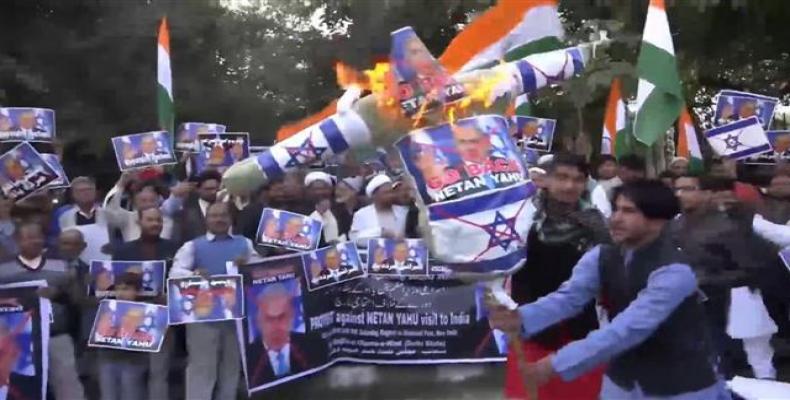New Delhi, January 15 (RHC)-- Israeli Prime Minister Benjamin Netanyahu has arrived in India for a six-day visit, and was met with protests throughout the capital and other cities around the country.
In the past, successive governments in New Delhi had been vocal about establishing closer ties with the Tel Aviv regime. During the January 14 to 19 visit, cooperation in the fields of defense, security, trade and agriculture will be high on the agenda.
Political analysts and activists, however, do not see a bright outlook of growing mutual ties between the two sides, saying while Israel is charging headlong into warmer ties with New Delhi, India is not always the easiest partner.
Reacting to the visit, Apoorva Gautam, head of the Boycott, Divestment and Sanctions (BDS) movement India, said the "intensifying" of diplomatic relations with Israel showed "there is deep contradiction in India's position at the international level with respect to Israel."
"There is an unmistakable attempt to join the U.S.-Israel camp except when it comes to taking positions at the UN." Elsewhere in her remarks, she said India's support for the Palestinian cause at the UN was in "response to international pressures and an attempt to not isolate India."
Modi's predecessors had mostly kept Israel at arm's length. In December, the Modi administration backed a UN resolution condemning U.S. President Donald Trump's new Israel-friendly policy regarding Jerusalem. India was among 128 countries to denounce Trump's recognition of Jerusalem as Israel's "capital."
India and Israel have had diplomatic relations for 25 years. Ties between the two sides have become more "visible" since Modi became prime minister in 2014.
Israel has been supplying India with various weapons systems, missiles and drones over the past few years, making India one of its biggest buyers of military hardware. The regime is currently selling an average of $1 billion of military equipment to India every year. Since Modi came to power, India has also signed several military deals with Israel.
There has been growing international concern over a renewal of border disputes between India and China. The hostilities had resulted in a short but deadly frontier war between the two sides in 1962, in which China emerged victorious. The two nuclear-armed powers share a 3,500-kilometer border, much of it is disputed between the two neighbors.
India is also facing intensified border tensions with Pakistan, due to the ongoing clashes in Kashmir, a disputed Muslim-majority region that has for years demanded independence or a merger with Pakistan.
In addition, the visit by the Israeli prime minister has also largely alienated India's large Muslim minority and offended human rights groups. Dozens of Muslims participated in a rally in New Delhi on Saturday to protest against the visit.
Protests Greet Israeli Prime Minister's Official Visit to India

Related Articles
Commentaries
MAKE A COMMENT
All fields requiredMore Views
- Brazil announces dates for BRICS summit
- Thousands take part in London rally against Donald Trump’s Gaza ownership plan
- U.S. lawmakers propose withdrawing from United Nations, saying it no longer serves Washington's interests
- Venezuelan government reveals terrorist plans dismantled before January 10th swearing-in of President Nicolas Maduro
- Cuban president congratulates new head of African Union Commission

